
The way your body appears from the outside when you’re overweight or obese is a fairly obvious thing that anyone can see; however, what about inside the body? The internal effects of those extra kilos of fat are not so widely appreciated. Dr Joel Fuhrman, in an off-stage video interview 1 while at the Real Truth About Health Conference 2 , gives us the low-down on one of the most devastating effects that being overweight has on our bodies.
Blog Contents
Overweight – a serious condition
Being overweight is not a cosmetic issue; rather, it’s a serious medical condition because when you’re overweight, your body becomes insulin sensitive/resistant 3 4 .
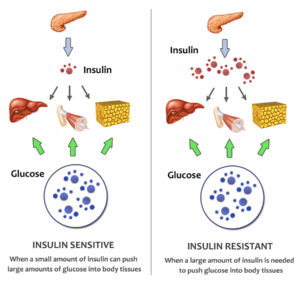
Insulin overproduction
Insulin sensitivity/resistance is basically when your pancreas has to produce more insulin in response to eating foods which, if you were not overweight, would not stimulate the pancreas to produce so much.
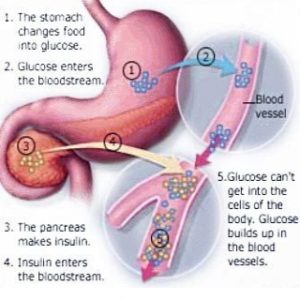
Thus, just eating oats or an apple will cause the pancreas to go into an insulin-production mode that exceeds what would happen if you were not overweight – according to Dr Fuhrman 5, up to 10 times the amount of insulin can be produced. The insulin wants to put the glucose into cells, but the receptors within cells become blocked from being able to accept the glucose because of the fat within the cell 6 .
This results in the pancreas having to overwork itself just in order to function normally. Any organ will suffer when it is having to overwork for prolonged periods of time, leading to type 2 diabetes and a whole host of chronic diseases.
Insulin promote cancer
Not a lot of people realise that excessive insulin production can cause cancer 7 8 9 .
Insulin promotes angiogenesis
As a fat-storing hormone, insulin can promote angiogenesis – that is, it can promote the growth of new blood vessels. We saw in an earlier blog 10 that reducing angiogenesis is a good thing for reducing the growth of cancers, since they need new blood vessels to feed them and allow them to grow.
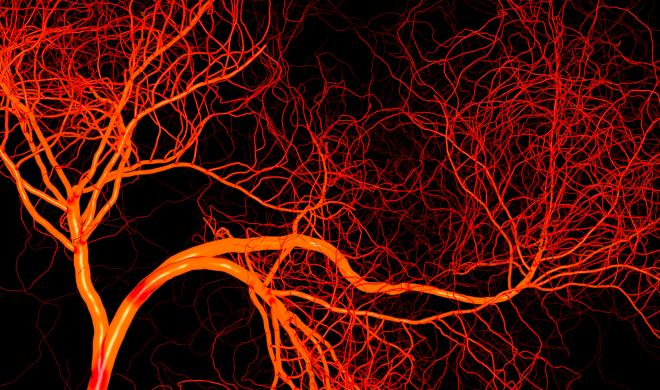
Dr Fuhrman explains that, for fat cells to grow within the body, they need to excrete angiogenesis-promoting hormones, and insulin further promotes this process. The new blood vessels then feed the fat cells with oxygen and glucose, etc – thus making the fat grow. By doing this, it also promotes other fat cells to grow 11 .
When you’re overweight, the continual circulation of insulin also promotes atherosclerosis 12 and prematurely ages the body 13 .
Fat cells & oestrogen
Another factor comes into play when you are overweight: namely, the higher levels of circulating oestrogen, which is linked to both breast cancer 14 and prostate cancer 15 .
Moderate is okay?
Dr Fuhrman considers that even being moderately overweight is a health risk.
He states quite bluntly:
“There’s no such thing as being a healthy overweight person. If you’re overweight, you’re not at your optimal health. You have to be at your optimal weight to have your optimal health.”
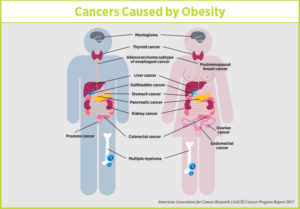
What causes us to be overweight?
He considers that the so-called SAD (Standard American Diet) is what’s really to blame. It keeps us addicted to wanting more food than the body requires.
But when you eat healthy food, you’re flooding yourself with healthy nutrients that the body needs. By eating the right foods, your appetite becomes normal and your weight drops, as he showed in a 2012 research project with 750 individuals who were able to naturally reduce appetite by increasing the nutritional quality of their diets 16 . When you’re body is cleaner, leaner and healthier – fuelled with phytochemicals and antioxidants – you’re not going to have to go through the discomfort of the usual detoxification process that most people experience when they are consuming the ‘wrong’ foods.
Why do most diets fail?
People fail on diets because they try to cut back on calories without increasing the nutritional quality of the foods they eat. And it’s so much easier and more natural to reduce excessive calorie intake when nutrient density increases.
Overweight linked to depression
Research shows 17 18 that when we are overweight, our brains are affected and the likelihood of becoming clinically depressed increases. And this isn’t just because we look in the mirror and don’t like the look of ourselves; it’s linked to biochemical changes within our bodies that change dependent on whether we are at or above our optimal weight.
One in five people in the USA are now classed as mentally ill, and the link between these mental conditions and body weight is clear 19 . And research is starting to uncover 20 a surprising and unwelcome association between increased violent and criminal activity and increased rates of obesity .
Good news – smaller is better
The good news is that normal function of the pancreas can be restored, and type 2 diabetes completely reversed 21 22 23 , through losing weight – ideally through eating an optimally healthy diet consisting totally or mainly of whole plant foods.
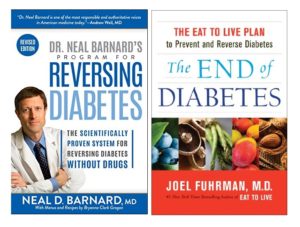
Final thoughts
There are so many benefits to being at one’s optimal body weight – both visually and in terms of the internal health of our bodies. It’s good to know that the best way to achieve and maintain this ideal body weight is not through will-power, but can be achieved naturally, healthily and relatively easily by simply eating the right foods for our bodies – that is, foods that are high in nutrients and low in empty calories.
And which diet fits the bill most perfectly? You guessed, a wholefood plant-based diet that avoids added salt, oil and sugar.
Keep an eye out for all the new recipes I regularly add to this website 24 . They’re all guaranteed to be optimally healthy as well as delicious and easy to make.
References
- Video Interview: What’s Wrong With Fast Food And Processed Foods? by Joel Fuhrman [↩]
- The Hippocrates Real Truth About Health Conference. [↩]
- J Clin Invest. 2000 Aug 15; 106(4): 473–481. Obesity and insulin resistance. Barbara B. Kahn and Jeffrey S. Flier. [↩]
- Curr Opin Endocrinol Diabetes Obes. 2012 Apr; 19(2): 81–87. What causes the insulin resistance underlying obesity? Olga T. Hardy, Michael P. Czech, and Silvia Corvera. [↩]
- Video Interview: What’s Wrong With Fast Food And Processed Foods? by Joel Fuhrman at 3 mins:41 secs. [↩]
- Lipids Health Dis. 2015; 14: 121. Published online 2015 Sep 29. doi: 10.1186/s12944-015-0123-1. The role of fatty acids in insulin resistance Barry Sears and Mary Perry. [↩]
- Curr Diab Rep. 2013 Apr; 13(2): 213–222. doi: 10.1007/s11892-012-0356-6. The Links Between Insulin Resistance, Diabetes, and Cancer. Etan Orgel, MD, MS and Steven D. Mittelman. [↩]
- Diabetes. 2010 May; 59(5): 1129–1131. Diabetes, Insulin Use, and Cancer Risk: Are Observational Studies Part of the Solution–or Part of the Problem? Jeffrey A. Johnson and Edwin A.M. Gale. [↩]
- Researchgate: Dagmar Slamenik, University of Cambridge – What is the role of insulin in tumors/cancer development? [↩]
- Blood Vessels on the Menu [↩]
- JCEM: Link between Adipose Tissue Angiogenesis and Fat Accumulation in Severely Obese Subjects. Amal Y. Lemoine Séverine Ledoux Isabelle Quéguiner Sophie Caldérari Charlotte Mechler Simon Msika Pierre Corvol Etienne Larger. The Journal of Clinical Endocrinology & Metabolism, Volume 97, Issue 5, 1 May 2012, Pages E775–E780 [↩]
- Does the Role of Angiogenesis Play a Role in Atherosclerosis and Plaque Instability? [↩]
- Circ Res. 2012 Apr 27;110(9):1252-64. Effects of aging on angiogenesis. Lähteenvuo J, Rosenzweig A. [↩]
- Breast Cancer Res. 2003; 5(5): 239–247. Oestrogen exposure and breast cancer risk
Ruth C Travis and Timothy J Key. [↩] - Springerplus. 2016; 5: 522. Oestrogens and oestrogen receptors in prostate cancer. Karolina Kowalska and Agnieszka Wanda Piastowska-Ciesielska. [↩]
- Dunaief DM, Fuhrman J, Dunaief JL, Ying. G. Glycemic and cardiovascular parameters improved in type 2 diabetes with the high nutrient density (HND) diet. Open Journal of Preventive Medicine 2012;2(3):364-371. [↩]
- Psychiatr Ann. 2012 Aug 1; 42(8): 305–308. The Relationship Between Obesity and Depression Among Adolescents. Deina Nemiary, MD, MPH, Ruth Shim, MD, MPH, Gail Mattox, MD, and Kisha Holden, PhD. [↩]
- JAMA: Meta-analysis. March 2010. Overweight, Obesity, and Depression – A Systematic Review and Meta-analysis of Longitudinal Studies. Floriana S. Luppino, MD; Leonore M. de Wit, MS; Paul F. Bouvy, MD, PhD; et al). [↩]
- Arch Gen Psychiatry. 2006 Jul; 63(7): 824–830. ASSOCIATION BETWEEN OBESITY AND PSYCHIATRIC DISORDERS IN THE US ADULT POPULATION. Gregory E Simon, MD MPH, Michael Von Korff, ScD, Kathleen Saunders, JD,1 Diana L Miglioretti, PhD, Paul K Crane, MD MPH, Gerald van Belle, PhD, and Ronald C Kessler, PhD. [↩]
- J Am Heart Assoc. 2018 Apr 3; 7(7): e008030. Police‐Recorded Crime and Disparities in Obesity and Blood Pressure Status in Chicago. Elizabeth L. Tung, MD, MS,Kristen E. Wroblewski, MS, Kelly Boyd, BS, Jennifer A. Makelarski, PhD, MPH, Monica E. Peek, MD, MPH, and Stacy Tessler Lindau, MD, MAPP. [↩]
- EndocrineWeb: Reversing Diabetes with Weight Loss: Stronger Evidence, Bigger Payoff. Written by Kathleen Doheny [↩]
- Dr. Neal Barnard’s Program for Reversing Diabetes: The Scientifically Proven System for Reversing Diabetes without Drugs [↩]
- The End of Diabetes: The Eat to Live Plan to Prevent and Reverse Diabetes [↩]
- WFPB Recipes. [↩]